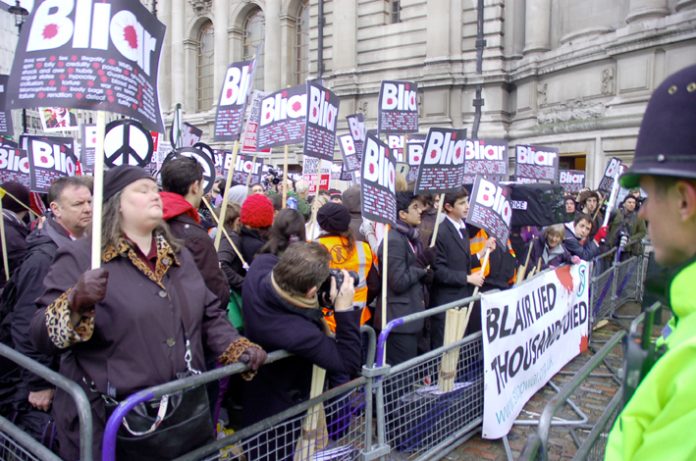TONY Blair was unrepentant about invading Iraq when he appeared before the Chilcot Inquiry into the 2003 war yesterday, and said repeatedly that he would do the same again.
Blair added for good measure that today’s leaders had to deal with Iran, just as he had dealt with Iraq, and also boasted about his role in persuading America to bomb Yugoslavia in 1999, as well as ‘regime change’ in Sierra Leone and Afghanistan.
Blair said the most important thing for him was to send out ‘an unremitting message’ after September 11, 2001, that ‘if you were a regime engaged in WMD you had to stop’.
But he admitted in questioning by the inquiry team that intelligence had proved to be ‘wrong’ and no WMDs were actually found in Iraq.
Thousands demonstrated outside the inquiry, demanding that Blair be tried for war crimes.
Blair was quizzed by Sir Roderic Lyne about his Fern Britton interview, when he was asked: ‘If you had known then that there were no WMDs, would you have gone on?’
The ex-prime minister told Britton: ‘I would still have thought it right to remove him.’
Questioned about this by Lyne, all that Blair would say is that, even with all his experience of doing interviews, ‘it still indicates I’ve got something to learn about it’.
Although Iraq was under sanctions and didn’t actually have any weapons of mass destruction, Blair told the inquiry that he had experienced a complete change of perception after September 11, 2001.
As far as he was concerned, his ‘perception’ was that there was now a serious threat to Britain from ‘rogue’ regimes around the world.
The danger was that these regimes might get WMDs, including nuclear weapons, and share them with the Muslim ‘fanatics’, who were much more dangerous than the IRA, Blair said.
Blair acknowledged there had been no link between Saddam Hussein and Al Qaeda, but said: ‘It’s absolutely essential to realise, if September 11 hadn’t happened, our assessment of the risk of allowing Saddam any possibility of reconstituting his programmes wouldn’t have been the same.
‘After September 11 our view and the American view changed and changed dramatically.
‘My advice was people would use chemical or biological weapons or a nuclear device if they could get hold of them.
‘We obviously had to deal with Afghanistan, but from that moment Iran, Libya, North Korea, Iraq, states that had been engaged in illicit activities and distribution of illicit material, all of this had to be brought to an end.’
But Roderic Lyne said: ‘Saddam was not the sponsor of Al Qaeda, he was not involved in 9/11 in any shape or form.’
‘I think Jack (Straw) puts it absolutely accurately,’ said Blair, ‘it wasn’t he had done more, it was our perception of the risk had shifted.’
‘This is a really important point actually.’
Blair said an ‘options paper’ drawn up after 2001 spelt out clearly that ‘smarter sanctions’ against Iraq had ‘no guarantee’ of working.
‘We had taken a decision post-September 11, this issue had to be confronted…the option of invasion was there and that option had always been there after September 11.’
Blair also admitted in questioning that the Iraq ‘options’ had been discussed at his Chequers countryside retreat, but not in a Cabinet meeting.
Blair admitted: ‘One thing I found throughout this whole matter from the very early stage is that I was never short of people challenging me.
‘There were people in Cabinet, for example Robin Cook and Clare Short.’
Short and Cook were not present at the Chequers meetings, which took place before Blair’s trip to Crawford, Texas, to meet George W. Bush in March 2002.
Roderic Lyne put it to Blair that the situation on WMD hadn’t essentially changed very much – ‘the perception’ had changed, but not the risk itself.
‘Yes’, Blair replied.
‘In trying to protect your country you have to take an assessment of risk,’ he said.
He continued: ‘I never regarded September 11 as an attack on America, I regarded it as an attack on us.
‘We stood shoulder to shoulder on Afghanistan and I was determined to do that again.’
Britain offered America the biggest military support it could.
Blair added: ‘My assessment of the security threat was intimately connected with the nature of the regime.’
Asked about the images of torture from Abu Ghraib that followed the invasion of Iraq, Blair said: ‘I was shocked and angry – shocked because it was wrong and angry because of the damage I knew it would do. . .
‘The activities of a few within the American or indeed the British forces shouldn’t take away from the fact that the majority of American and British forces were doing a magnificent job.’
Over a million people died following the invasion of Iraq and Blair was asked if he should take some responsibility for what happened as a result of the war.
Blair said: ‘We built up the capacity of the Iraqi forces themselves…I agree that it is our responsibility.’
Blair added: ‘Suppose we’d left Saddam – and his sons who were going to follow him – in charge of Iraq…Had we taken the decision to leave him there with an oil price, not of $25 but of $100 a barrel, he would have had the intent, he would have had the financial means and we would have lost our nerve.’
